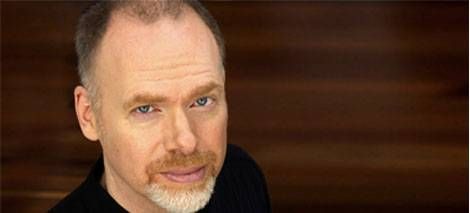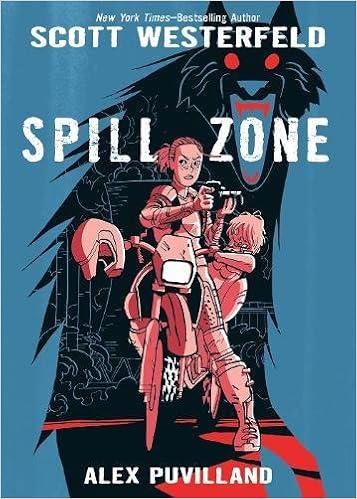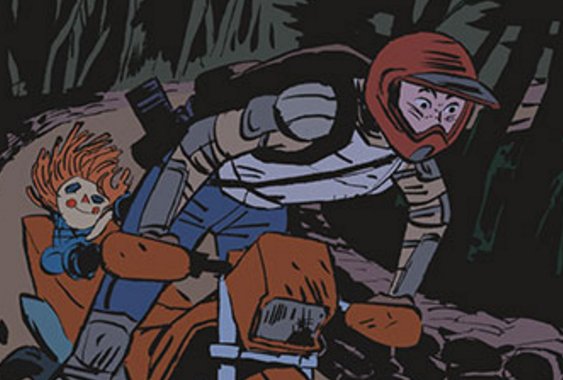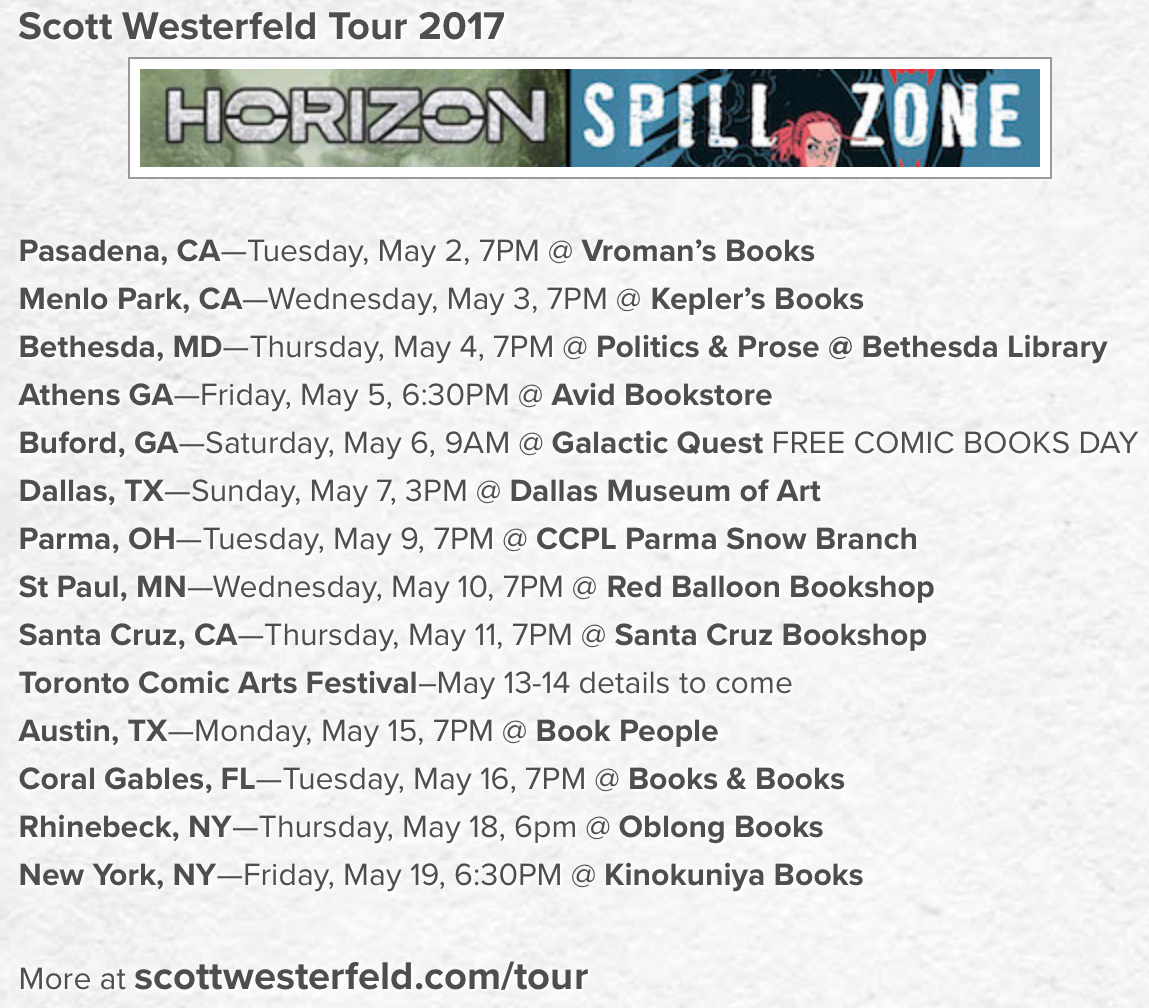
A Conversation With Scott Westerfeld
Scott Westerfeld holds a special place in my heart because I read all of his YA novels in high school, and the Leviathan series in college. I always consider meeting authors I admire, but getting the chance was amazing.
Scott has published a plethora of SFF novels and graphic novels. His works include the Zeroes trilogy, the Uglies trilogy, Peeps, So Yesterday, the Leviathan trilogy, and Afterworlds. This year he’s released The Spill Zone, a graphic novel about a strange alien visitation and its consequences, as well as Horizon, a middle grade novel about surviving a harsh wilderness with unknown creatures. In The Spill Zone, Addison hopes that by photographing the strange titular zone that she can earn enough money to take care of her little sister Lexa, avoid the authorities’ scrutiny, and make sense of the tragedy that killed their parents and changed her life forever.
Scott had a pleasant, warm voice. He patiently waited as I asked if I can record the interview and then realized that I couldn’t record it on my iPhone. We started talking about The Spill Zone, which has both an online and print version. I ask what inspired the story.
“When I was in college, I used to explore abandoned buildings,” he explained. “I always find abandoned places to be interesting settings, because they have layers of history, and a hint of magic. In college it was the time of Chernobyl, and an incident in Brazil where abandoned radiotherapy equipment fell into the wrong hands.”
This event was the 1987 Goiânia accident. Two locals stole the radiotherapy equipment and dismantled it for scrap material. The radioactive material spread as a result, affecting over one hundred thousand people. While the survivors received legal recompense, the impact from contamination has persisted for decades. In Chernobyl, a nuclear power plant suffered safety failures, leading to fallout spreading over the region. The ensuing consequences, for the humans and environment, motivated Europe to not allows such a tragedy to happen again. With these events in mind, one sees the parallels to Addison’s situation.
“Addison basically is the only one left,” Scott said. “Her hometown and her family has basically been destroyed. What makes her a cool character is her art. Her photography chronicles what remains.”
On Siblings
In Scott’s previous works, siblings work in tandem, or sometimes handle their issues without help. Addison has to make sure that the authorities don’t find out about her photography, or that will mean instant foster care or a scientific lab for Lexa, who mysteriously survived the alien impact.
“I think siblings have always been an interesting part of YA,” he said. “It’s a very big part of when you grow up. Addison has to become a parent, so that’s always a really fascinating dynamic. All of that responsibility is foisted on her. In addition, every family has its own little culture. So when a family is destroyed, your the last remaining member of that culture. Addison wants to explore what was lost.”’
The females in Scott’s world exist on a spectrum, but they are all people, not cardboard cutouts or love interests. Tally Youngblood in the Uglies trilogy is plucky and impulsive, while Darcy Patel in Afterworlds is intellectual and adventurous. Deryn Sharp in Leviathan is loyal and courageous. I asked Scott what helped him write female characters so well.
“I have two older sisters,” he explained. “My oldest sister, she wasn’t into stereotypically girly things. She fixed cars . . . at the age of 57, she goes spelunking. Every time I see her in person, she has some terrifying tale about almost being trapped in a cave forever. When I was a teenager, I felt like girls were better at exploring their interiority. It’s easier for me to write.”
It helps that Justine Larbalestier, a fellow YA author and Scott’s wife, helps him with perfecting his stories. They read aloud to each other, and brainstorm during development stages.
“She reads more graphic novels than I do,” Scott said. “She’s my interlocutor first reader in all things. I had a complete script [of The Spill Zone] for the artist, but that script was about seventy five percent. Alex Puvilland, the artist, turned a lot of six-page scenes into seven- or eight-page scenes.”
Scott’s other release this year, Horizon, can server as a counterpart to The Spill Zone. He describes Horizon as more adventurous horror, aimed at children. While in Horizon the main characters are stranded from civilization, Addison remains connected to the human world.
“What she’s doing is illegal, but she has to hide it from the government,” Scott explained. “The Spill Zone is about straddling that line between the wild & civilization. In Horizon, the characters are completely cut off from civilization and have to survive in the wild.”
On Tour
To promote The Spill Zone, Scott scheduled a book tour, including Fierce Reads with three debut authors: Erin Beaty (The Traitor’s Kiss), Taran Matharu (The Battlemage), and Kristen Orlando (You Don’t Know My Name).
“It’s cross-pollination,” he explained. “My readers will find these new books and authors while coming to see me, and vice versa. We, and our readers, will be in conversation the whole time. “
We talked about his other books, like Afterworlds and its accurate representation, on if characters can make mistakes, as well as growing Twitter discussions and social media. I asked his thoughts on readers judging authors in social media. He thought about it.
“I think social media is giving voice to a lot of people who have those concerns out there,” he said. “I think it’s very interesting to hear all the critiques which would have been unnoticed at all.”
In 2018, Scott will release a sequel to the Spill Zone in June, and the third Zeroes book in March. Other authors will write Horizon books, and he’s thinking of doing a podcast about literature. His books and approach to life show optimism during dark times, and creating joy out of despair. What comes can only make our world better.
















